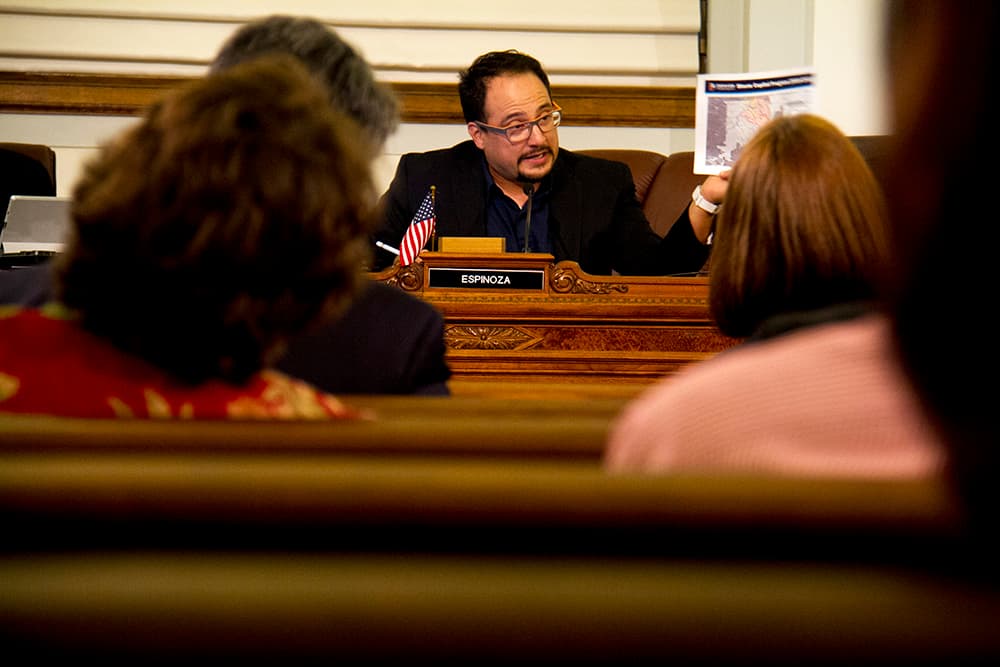Denver on Wednesday moved closer to banning bump stocks, the devices that allow semi-automatic weapons to work more like rapid-fire automatics. If approved, it would make Denver one of the first cities to ban the devices.
"Why would we allow a rank amateur to have that sort of firepower and capacity, unnecessarily, if we’ve already banned machine guns of this type?" said Councilman Rafael Espinoza, who introduced the bill.
The proposal:
- Make it illegal to carry, store or otherwise possess a bump stock in Denver.
- Make it illegal to have a gun magazine that can hold more than 15 rounds in Denver. The current limit in Denver law is 21 rounds, but this change brings the city into sync with state law.
- Set the punishment as a fine of $100 to $999 and jail time of 10 to 180 days.
The bill would define bump stocks as "any device for a pistol, rifle, or shotgun that increases the rate of fire ... by using energy from the recoil of the weapon to generate a reciprocating action that facilitates repeated action that facilitates repeated activation of the trigger."
In other words, bump stocks use the recoil of the weapon to set off the trigger again, creating a rapid-fire cycle. The Las Vegas shooter reportedly used bump stocks to fire 90 shots in a 10-second period. In comparison, the Pulse nightclub shooter did not have a bump stock and fired 24 shots fired in a 9-second period, per The New York Times.
Denver already bans "assault weapons," which it defines as "semiautomatic action, centerfire rifles with a detachable magazine." Find more information here.
The reactions:
The Denver City Council's Safety, Housing, Education & Homelessness Committee approved the proposal without objection on Wednesday. Next, it goes to the full council for a vote.
Support from council members and other speakers was unanimous at the committee meeting. "This is a crucial next step in demonstrating our commitment to public safety," said Amy Chambers, a volunteer with Moms Demand Action for Gun Sense in America.
Alan Kennedy-Shaffer, a state senate candidate and a captain in the Army National Guard, praised Espinoza. "In the absence of action at the federal level and the state level, it’s refreshing to see city council stepping up once again to move the ball forward to save lives," he said.
"I’ve used these weapons as a member of the military. They have one purpose: for killing a lot of people in a very short amount of time."
Some council members had specific questions. Councilwoman At-large Robin Kniech asked why the maximum jail time was set at 180 days, which is the lower tier in Denver's laws. However, she said that the limit "probably makes sense," given that there is a minimum jail term.
Councilwoman Kendra Black asked why magazine limits aren't stricter in Colorado. "My question is sort of technical. Is there a reason why 15 (rounds) is the number at the state? Why isn’t it zero?" she said, winning applause.
"A journey of a thousand miles begins with a single step," said Councilman Paul Kashmann. "This is a thousand-mile journey. This is an important initial step."
Espinoza's office had received five phone calls and 11 emails in support of the bill as of Jan. 5, mostly from outside the district. It had received a single email in opposition, which came from outside his district.
What are others doing?
The federal government has signaled it might take action on bump stocks, issuing an advanced notice late in December. It currently doesn't regulate bump stocks, but it will consider reinterpreting whether they meet the definition of a "machine gun," which is banned everywhere in the U.S.
“While the ATF anticipates a notice of rule making, it is hard to tell what the outcome will be -- if the federal government will or will not adopt a regulation of bump stocks," said Kirsten Crawford, legislative counsel to the council.
California has outlawed the devices since 2012, while Massachusetts banned them in November, as did Columbia, S.C., in December. Legislators in Nebraska and Kansas are among the others considering action.
This post was updated on Jan. 5 with information about the response to Espinoza's office about the bill.











